FOI 23/24-0958-DISCLOSURE LOG
** Do not include this cover slide into a presentation **
DOCUMENT 1
Title:
Aged Care and the NDIS
Audience:
Mainstream and community stakeholders
Usage:
Suitable for use by community engagement staff
Notes:
•
Presenter can mix and match slides from other presentations, remove or hide slides not
needed. Presenter should amend the dialogue in the speaker notes to suit the
audience
•
Please amend cover and last slide where marked
•
Co-design and Engagement Branch to update post approvals
Restrictions:
NIL
Date released:
12/8/2019
Date updated:
09/01/2023
** Do not include this cover slide into a presentation **
Page 1 of 45
FOI 23/24-0958-DISCLOSURE LOG
** Do not include this cover slide into a presentation **
Version control
Version
Date
Amended by
Changes made
Status
1.0
12/8/2019
Unknown
Presentation created
Approved
1.4.1
13/10/2021
Unknown
Minor update to review messaging on slide
Approved
16, and update to slide master
1.4.1
06/06/2023
NEL199
Moved to widescreen
Approved
1.4.2
10/07/2023
MM0086
Updated content to align to YPIRAC
Approved
Operational Guidelines and Aged Care
2.0
09/01/2023
NEL199
Inclusion of Applied Principles and Tables of
Approved
s22(1)(a)(ii) - irrelevant material
Support (APTOS) contennt.
M.
Director,
YPIRAC
Hospital
Interface
Branch
** Do not include this cover slide into a presentation **
Page 2 of 45

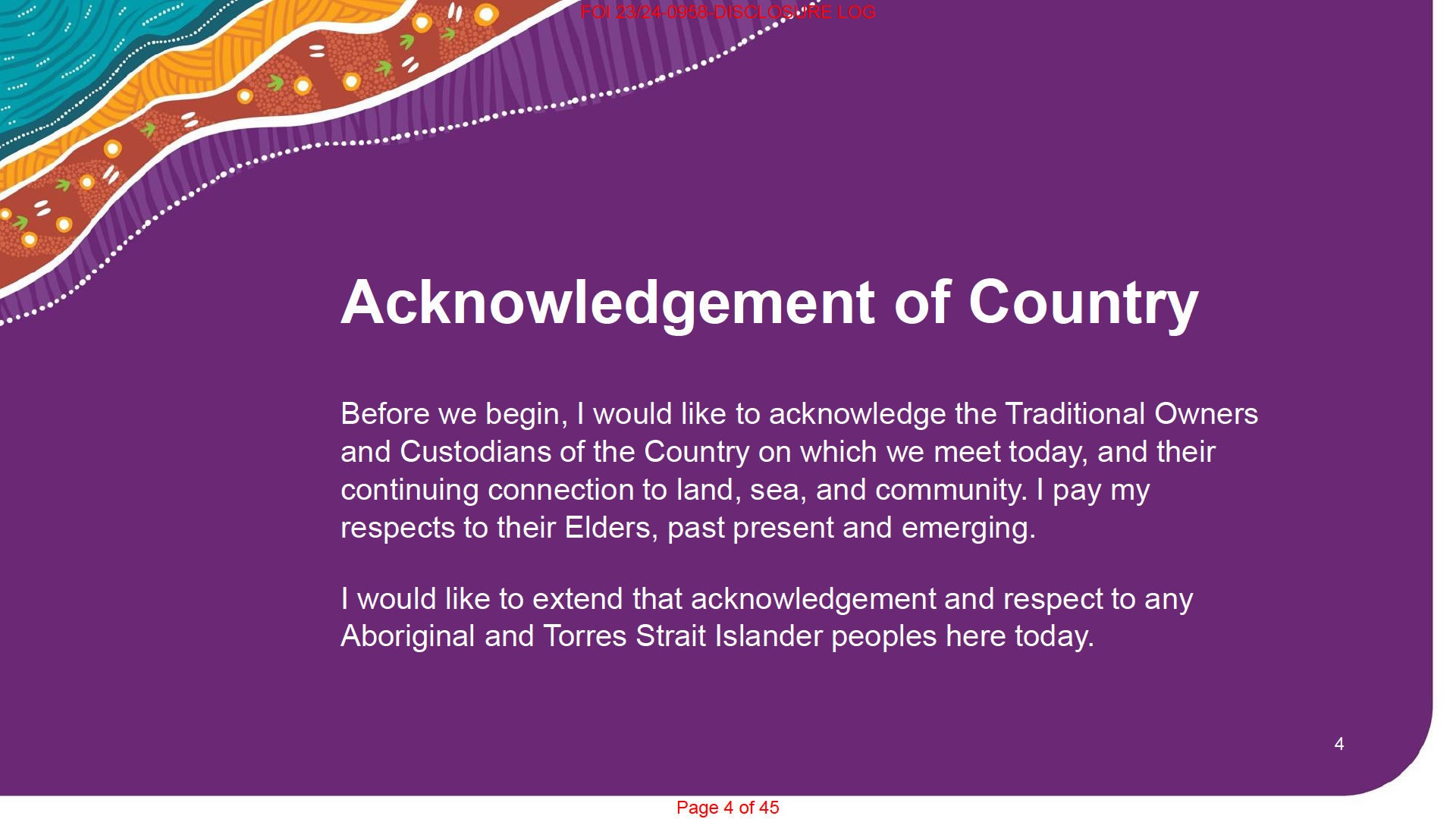


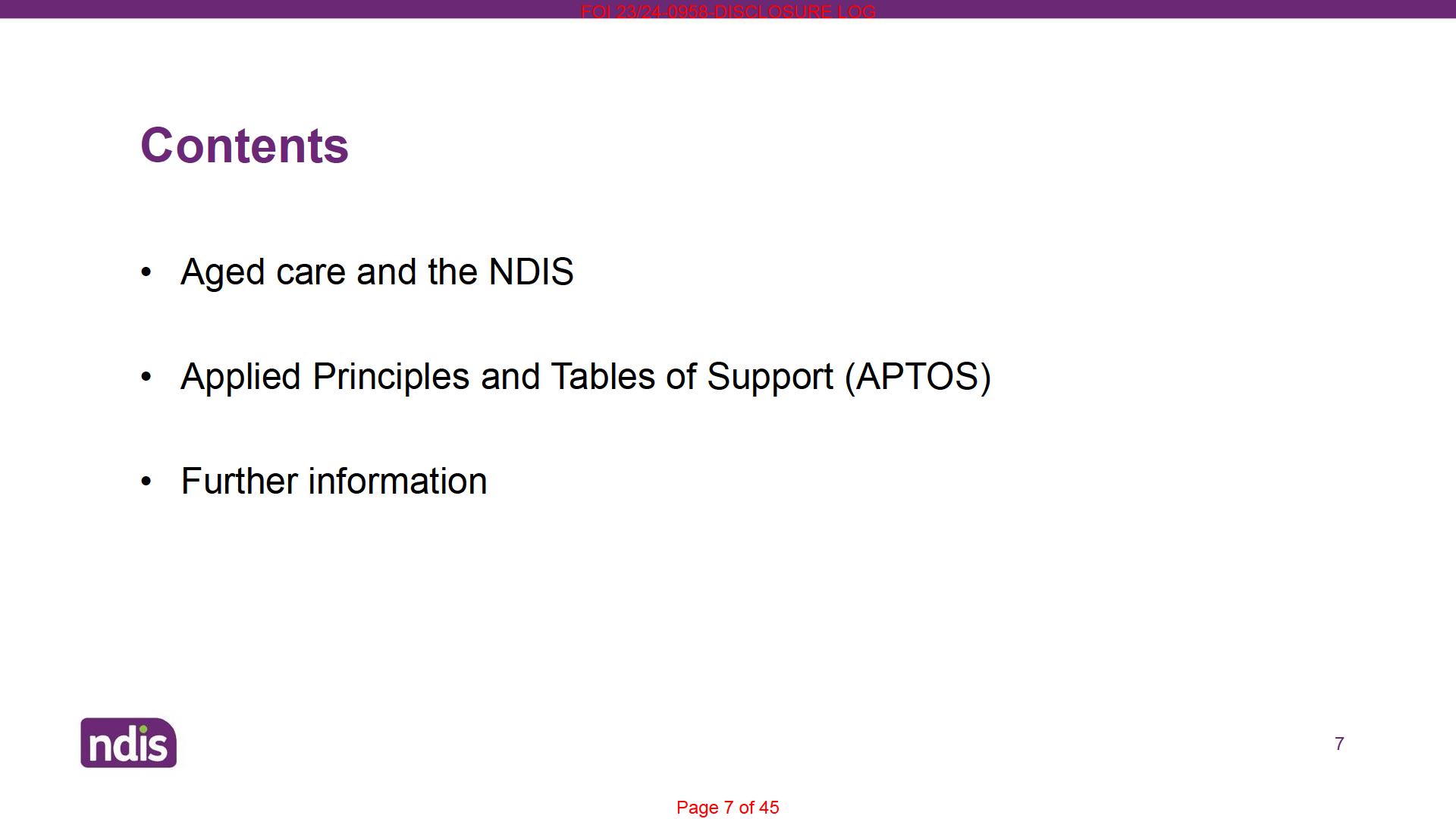
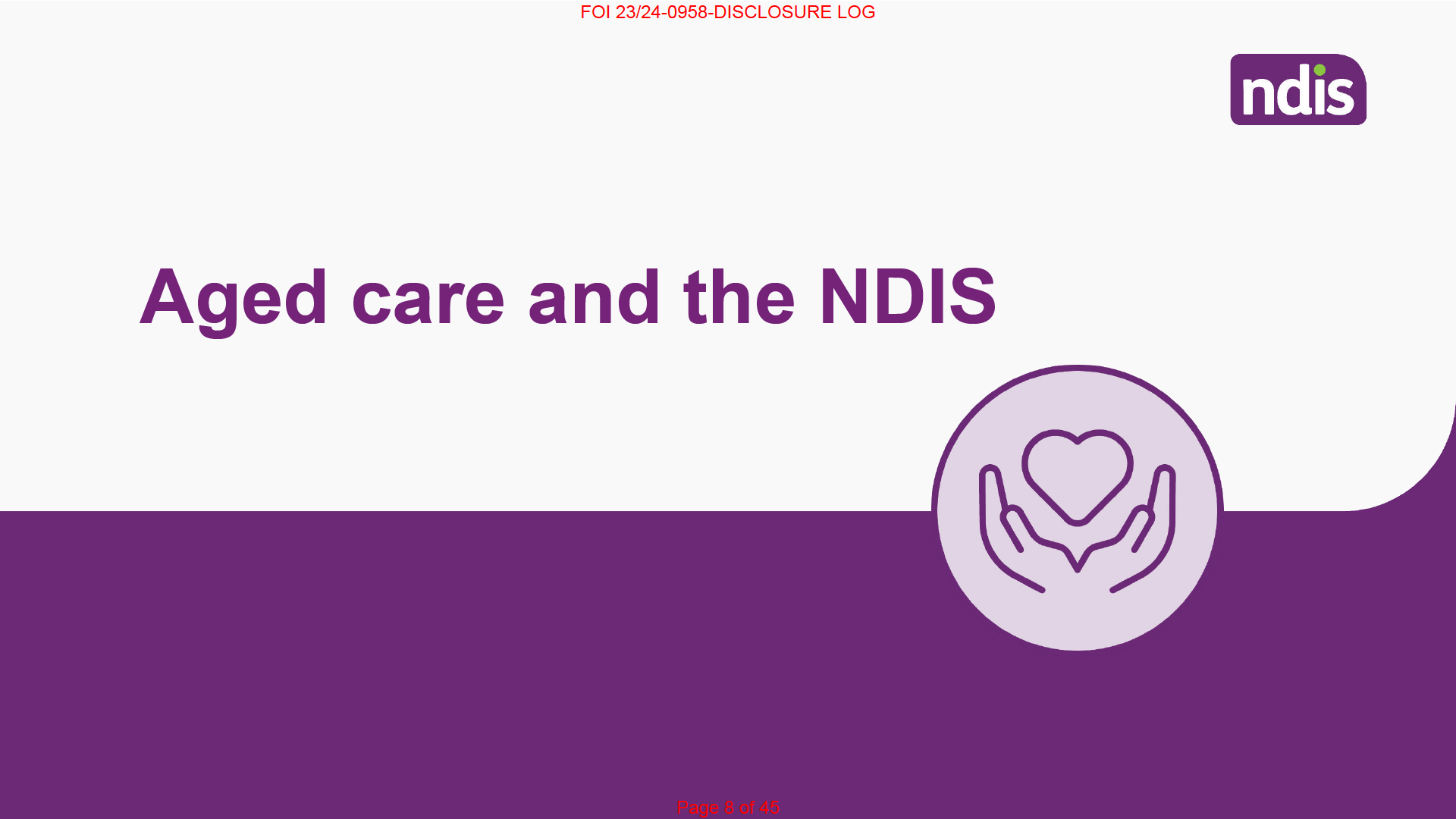
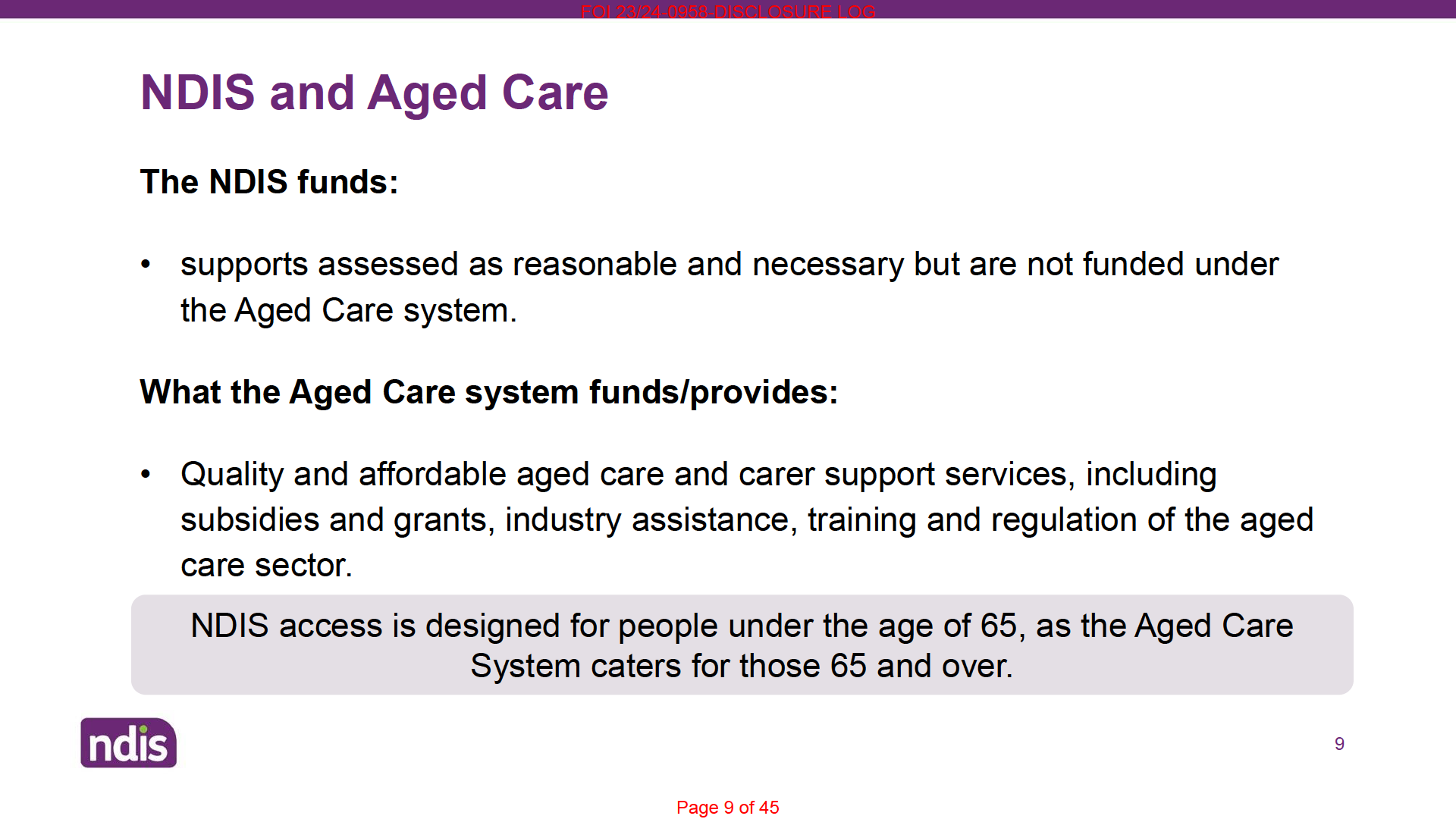
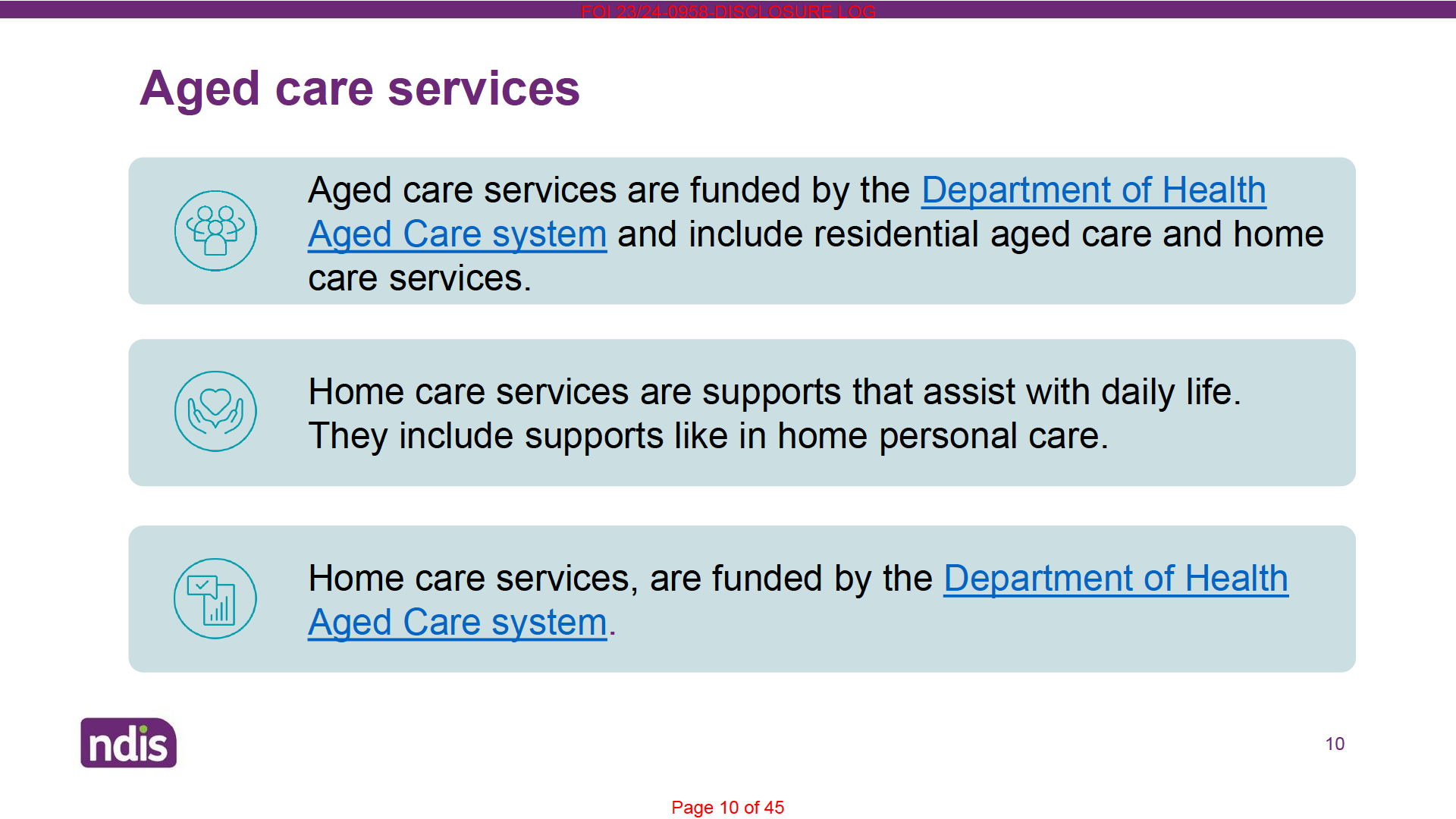
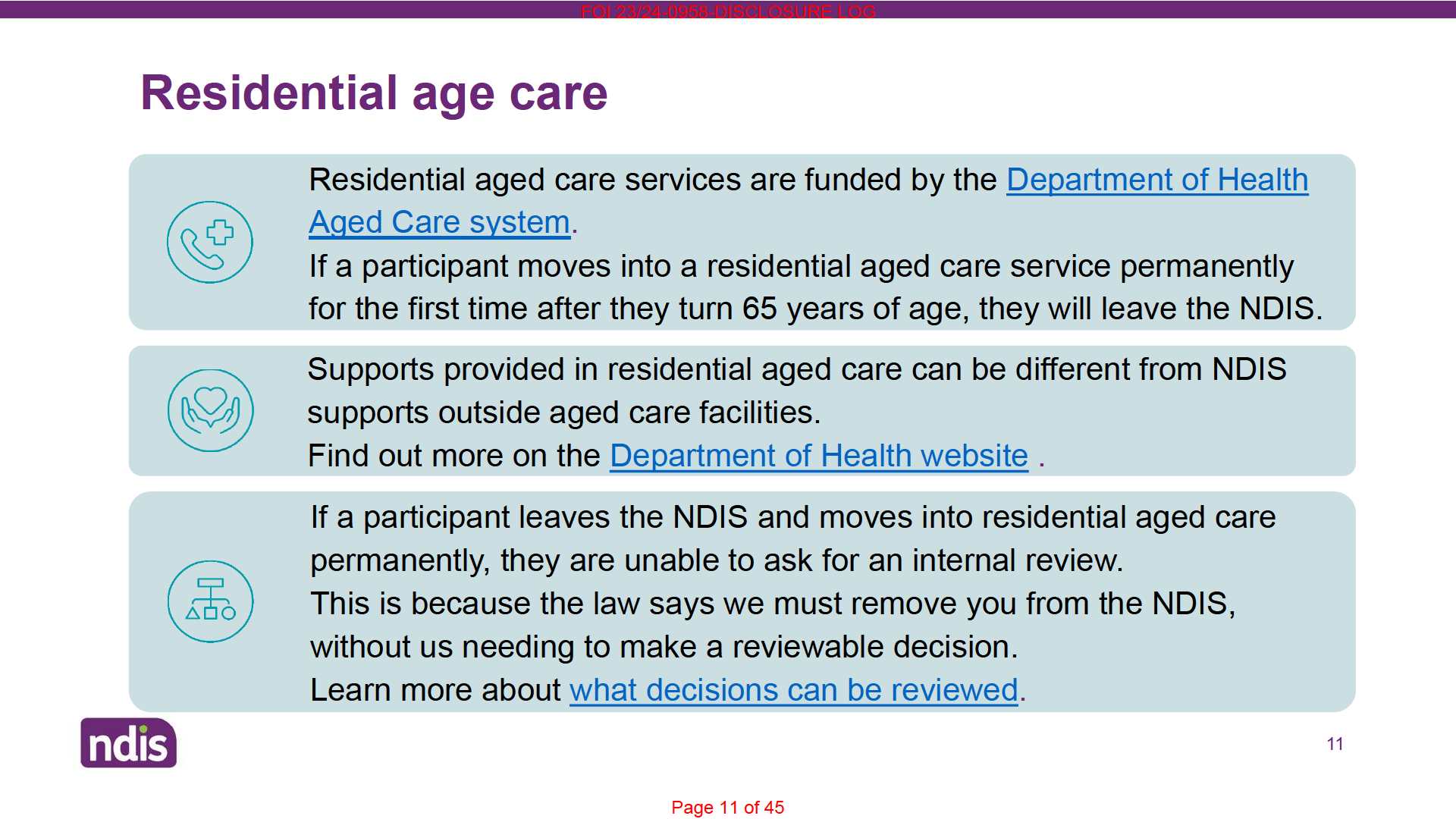


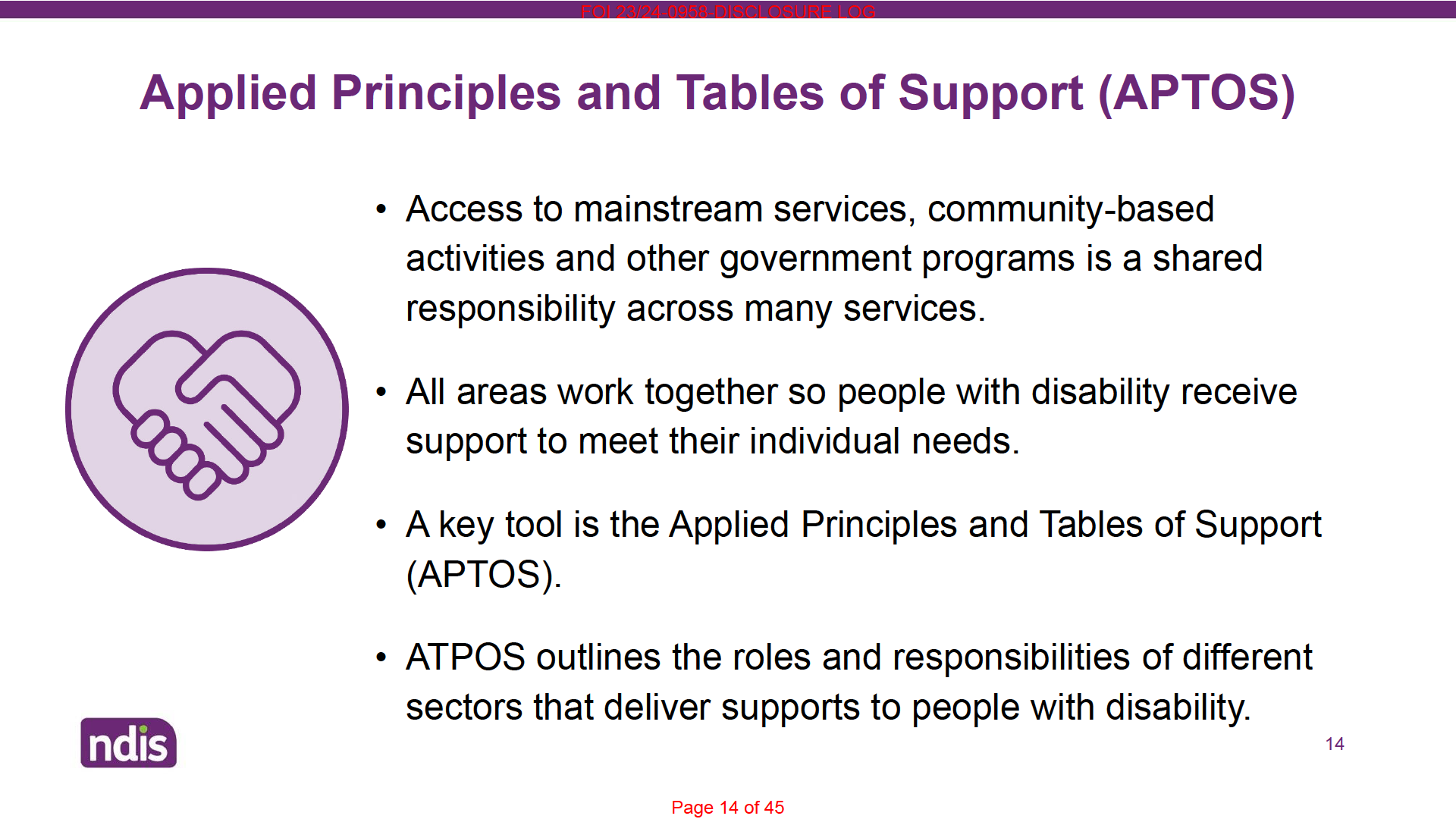
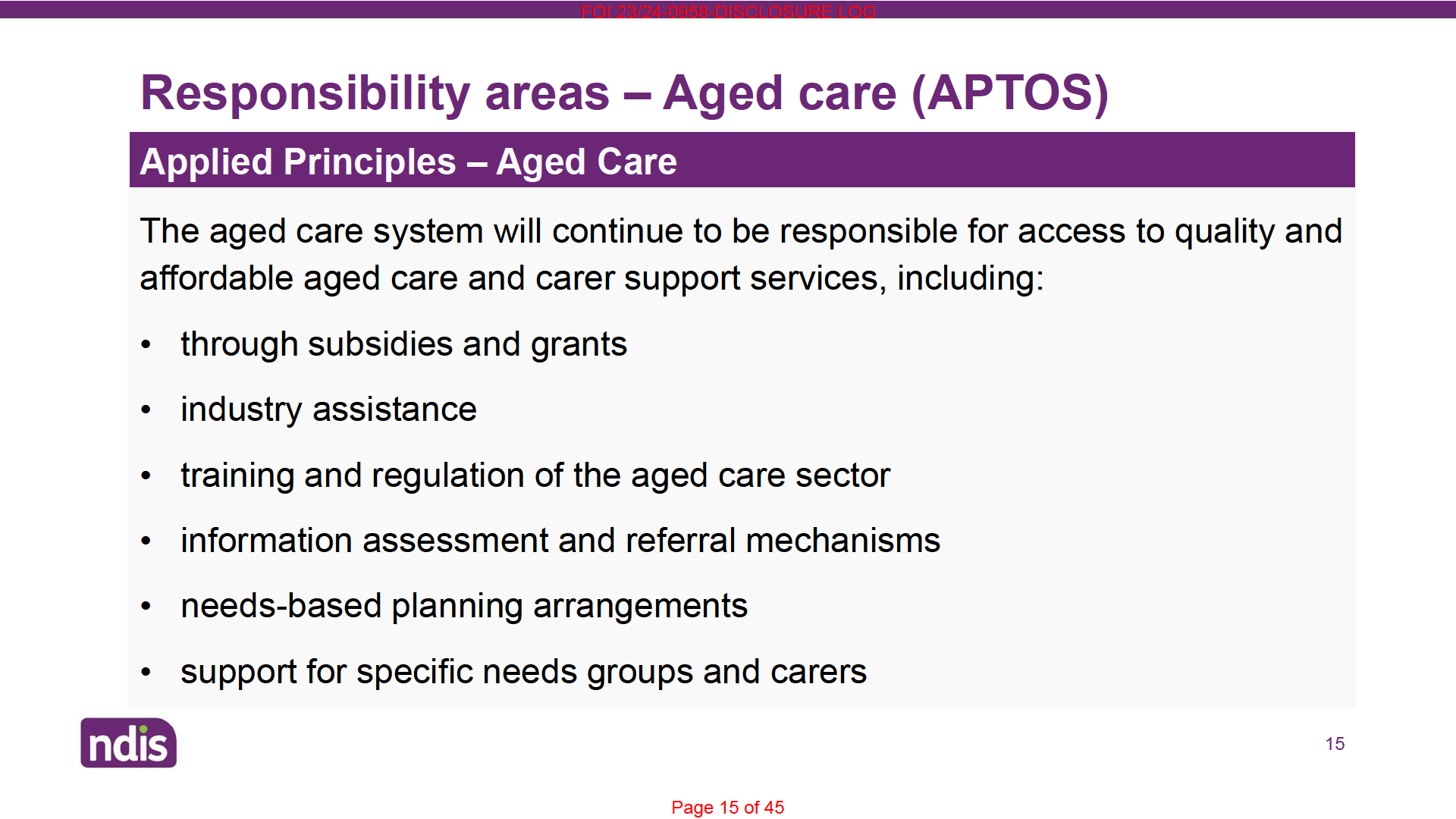
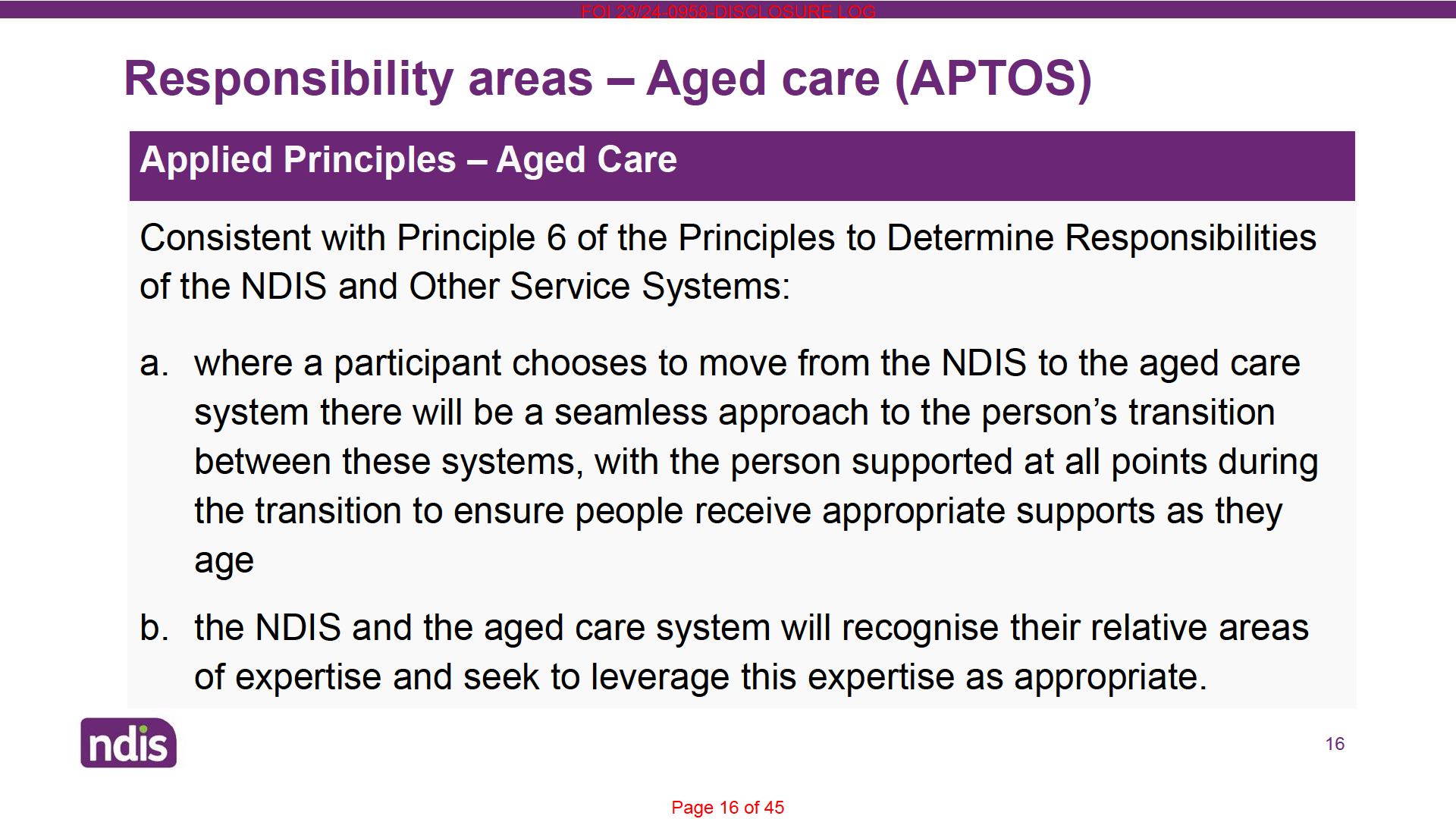
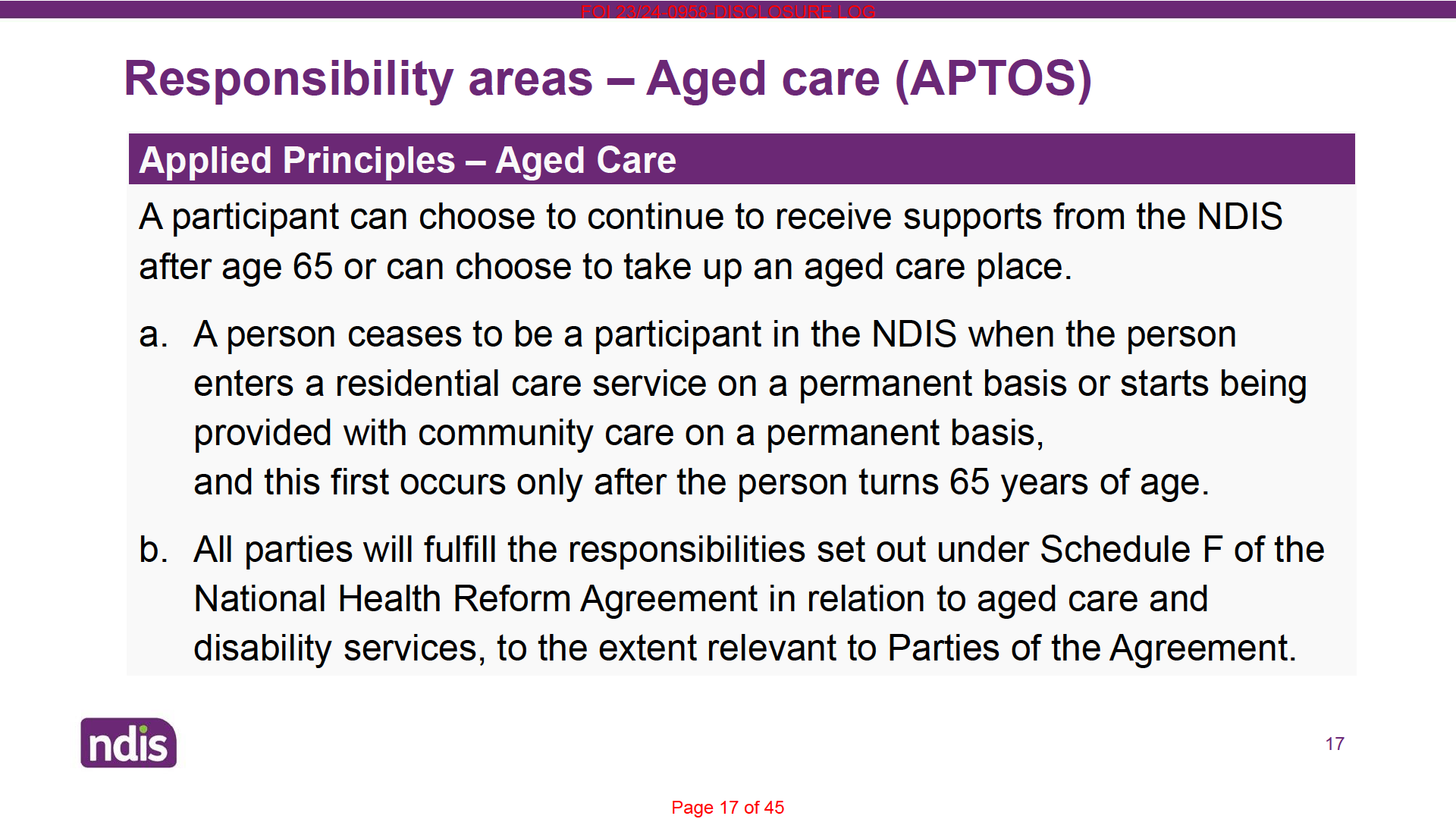


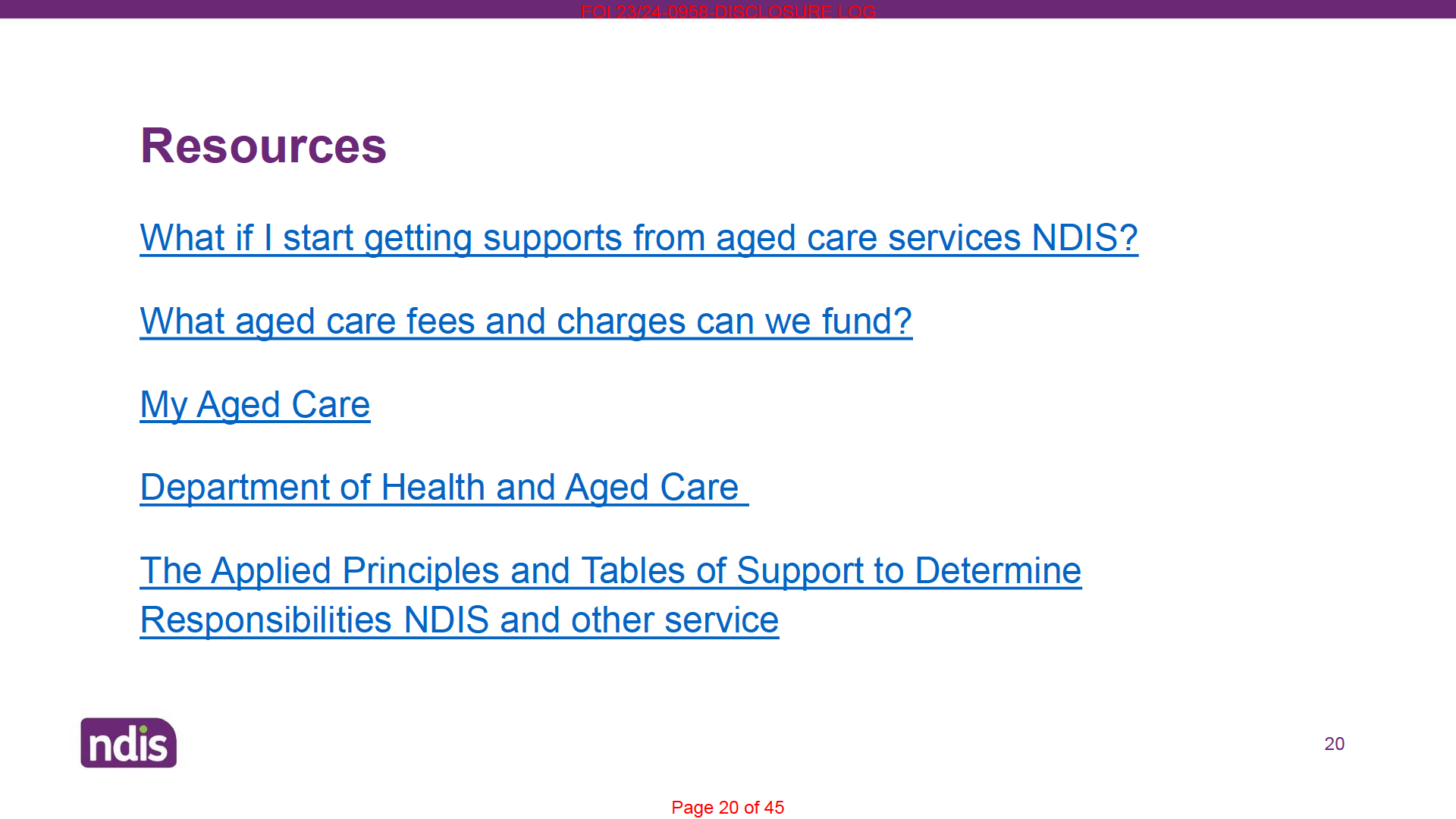

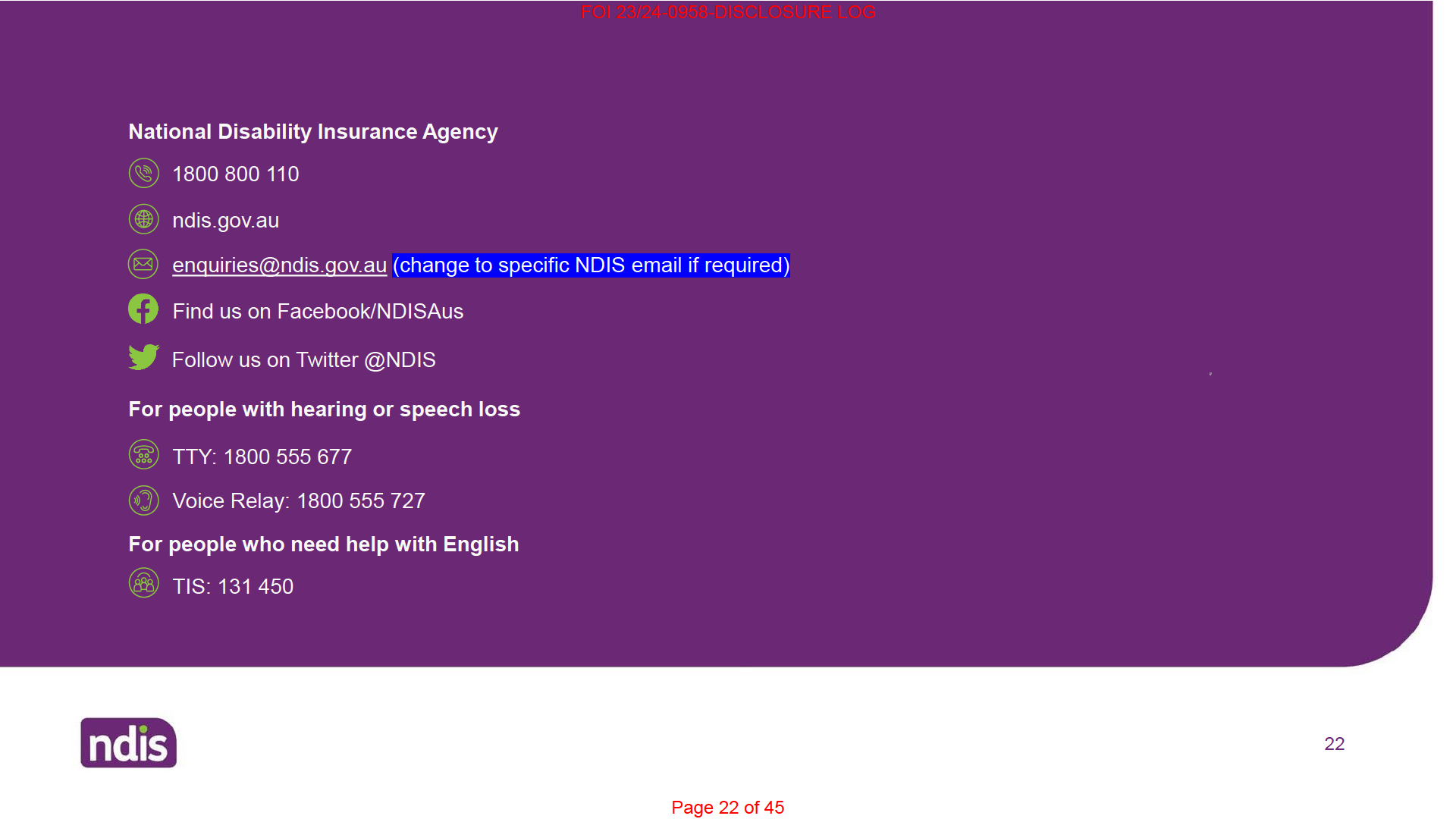
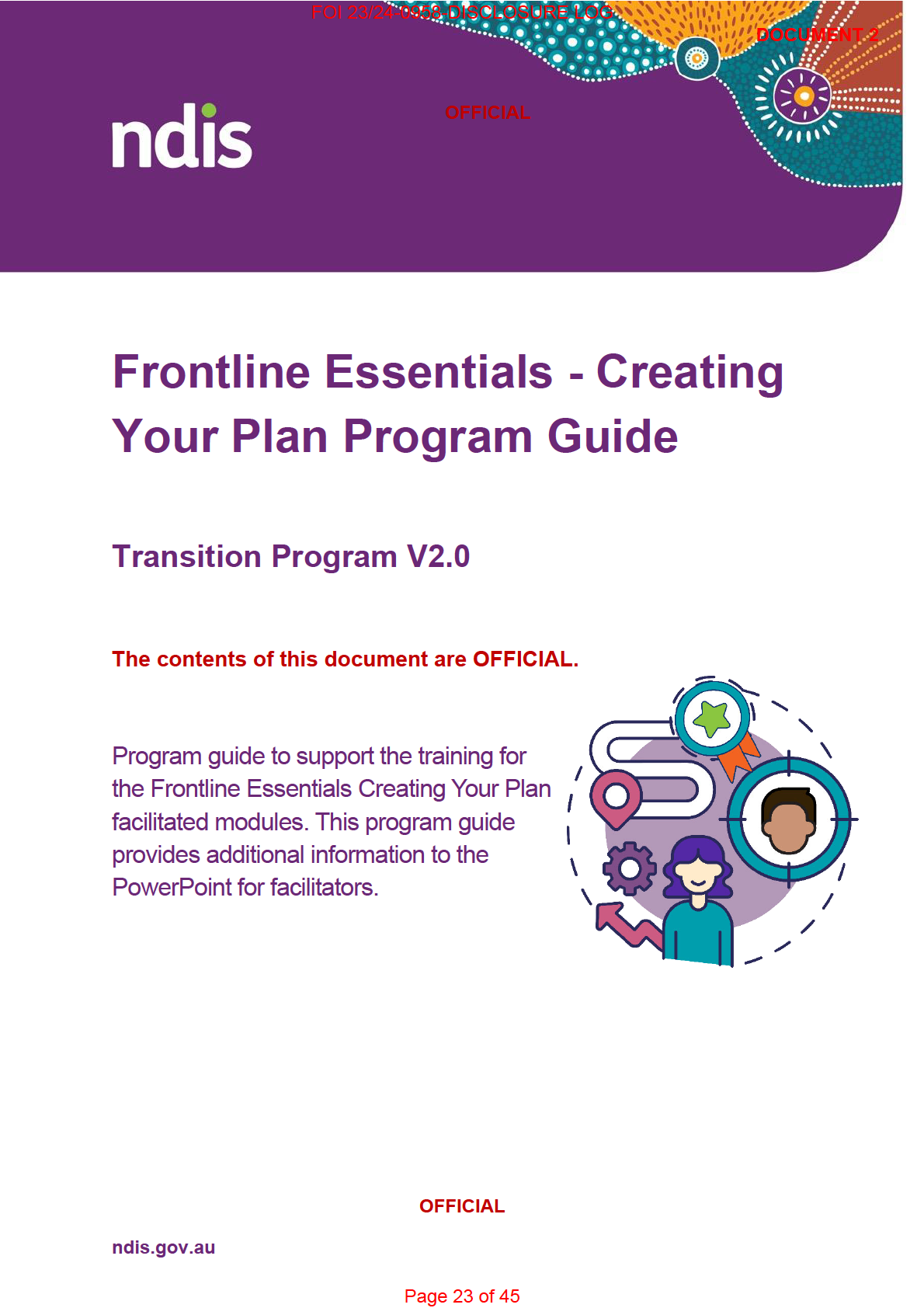
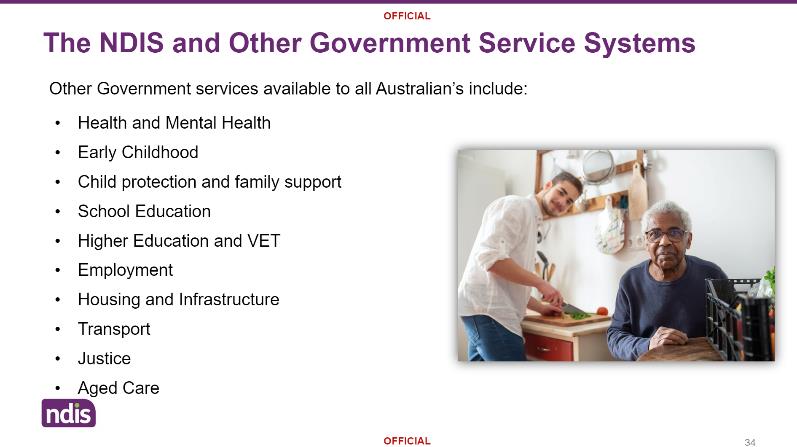
FOI 23/24-0958-DISCLOSURE LOG
OFFICIAL
s22(1)(a)(ii) - irrelevant material
The NDIS and Other Government Service Systems
Display Slide 34
OFFICIAL
ndis.gov.au
56
Page 24 of 45
FOI 23/24-0958-DISCLOSURE LOG
OFFICIAL
State: Here is the list of other Government services which are available to
all
members of the Australian community, regardless of whether they have a disability
or not.
We have aged care listed here, however Aged Care isn’t really considered a
'mainstream or other Government service system' for NDIS participants.
Ask: Why not?
Debrief: NDIS continues to fund disability related supports for participants who are
aged over 65.
Ask: When might this change?
Answer: If the participant permanently commences accessing Aged Care services
after they turn 65.
State: We always need to be aware that the Scheme is intended to build a more
inclusive society, where the participation of people with a disability is maximised in
the whole community.
The Scheme isn’t intended to replace the supports or services provided by these
systems, because those risks isolating participants away from their communities.
Now, we all know that sometimes there are gaps or wait times with other
Government services. But whether or not the funding or service is fulfilling its
responsibility, remember;
that’s not the legal test!
Prior to the launch of the NDIS, the Council of Australian Governments, made up of
representatives from each state and territory government and the federal
government, put together a table of the supports and the underpinning applied
principles to determine which government would be responsible for a variety of
supports. This interface, also called the other Government or mainstream interface,
covered 11 types of services, from justice and employment to early education. The
applied principles and the table of supports outlined when supports are likely to be
the responsibility of (and therefore most likely funded by) the NDIS, when they are
likely to be the responsibility of another service system.
OFFICIAL
ndis.gov.au
57
Page 25 of 45
FOI 23/24-0958-DISCLOSURE LOG
OFFICIAL
Not long after the launch of NDIS, these applied principles and the table of supports,
called Applied Principles and Tables of Support (APTOS), were entered in the
Supports for Participants Rules 2013 as Schedule 1, which means that NDIS
decisions makers must take these applied principles and tables of support into
account when making reasonable and necessary decisions.
In 2019 the COAG was disbanded and reformed under the National Foundation
Reform Council, however the APTOS remains enshrined in our Supports for
Participants Rules 2013 under Schedule 1: Considerations relating to whether
supports are most appropriately funded through the NDIS.
Delegate decision makers have used and explored the applied principles and table
of supports since the Scheme was launched in 2013. To help make decision making
clearer, the Agency provided even more guidance through the Operational
Guidelines, including putting these principles into a table format in the Planning
Operational Guideline (appendix 1), which is informed by the legislation and rules, as
well as these principles and Disability Reform Council reforms.
However, there’s, some important points we should all remember about the ATPOS:
• The COAG Principles were agreed upon before the NDIS was launched in
2013 and these principles were reviewed in 2015
• The Agency was not involved with the development or agreement of the
principles
• These were agreed to by the Commonwealth, State and Territory
governments; and
s22(1)(a)(ii) - irrelevant material
OFFICIAL
ndis.gov.au
58
Page 26 of 45


FOI 23/24-0958-DISCLOSURE LOG
DOCUMENT 3
The contents of this document are OFFICIAL.
Ministerial and agency correspondence
standard words
s22(1)(a)(ii) - irrelevant material
V20240116
NDIA Standard Words Ministerial and Agency Correspondence Words
Page 1 of 87
This document is uncontrolled when printed.
Page 28 of 45

FOI 23/24-0958-DISCLOSURE LOG
Table of Contents
Ministerial and agency correspondence standard words ....................................... 1
s22(1)(a)(ii) - irrelevant material
Support for people over 65 years of age .............................................................................. 45
s22(1)(a)(ii) - irrelevant material
V20240116
NDIA Standard Words Ministerial and Agency Correspondence Words
Page 2 of 87
This document is uncontrolled when printed.
Page 29 of 45

FOI 23/24-0958-DISCLOSURE LOG
s22(1)(a)(ii) - irrelevant material
Support for people over 65 years of age
Ministerial Response
The NDIS as an insurance-based scheme and takes a lifetime approach to a participant’s
support needs. The NDIS provides disability related supports to people with permanent and
significant disability. NDIS supports are designed to complement, not replace, other available
supports with government services such as health, aged-care, education, justice and transport.
For participants who have turned 65 years old, consideration for their presenting needs will
be made in relation to the most appropriate service that can meet their support requirements.
V20240116
NDIA Standard Words Ministerial and Agency Correspondence Words Page 45 of 87
This document is uncontrolled when printed.
Page 30 of 45

FOI 23/24-0958-DISCLOSURE LOG
To be eligible for the NDIS, a person must first be younger than 65 when they apply. Then
there are other requirements set out in the
National Disability Insurance Scheme Act 2013 that need to be met. These include information about residence, disability or early
intervention requirements. If a person is close to turning 65 years old and wants to apply to
the NDIS, it is best for the applicant to contact the NDIA directly enabling the NDIA to
provide advice and support for the applicant to apply on time. When an NDIS participant
turns 65 years old, they can choose to either stay with the NDIS or leave and get support from
the aged care system.
If a participant turns 65 and enters residential aged care on a permanent basis for the first
time, they are subject to being ceased from the NDIS under section 29(1)(b) of the
National
Disability Insurance Scheme Act 2013.
Agency Response
The NDIS as an insurance-based scheme and takes a lifetime approach to a
participant’s support needs. The NDIS provides disability related supports to people
with permanent and significant disability. NDIS supports are designed to
complement, not replace, other available supports with government services such as
health, aged-care, education, justice and transport.
To be eligible for the NDIS, a person must first be younger than 65 when they apply.
Then there are other requirements set out in the
National Disability Insurance
Scheme Act 2013 that need to be met. This includes information on residence,
disability or early intervention requirements. If a person is close to turning 65 years
old and wants to apply to the NDIS, it is best for the applicant to contact the NDIA
directly so the NDIA can provide advice and support to assist the applicant to apply
on time. When an NDIS participant turns 65 years old, they can choose to either stay
with the NDIS or leave and get support from the aged care system.
s22(1)(a)(ii) - irrelevant material
V20240116
NDIA Standard Words Ministerial and Agency Correspondence Words Page 46 of 87
This document is uncontrolled when printed.
Page 31 of 45
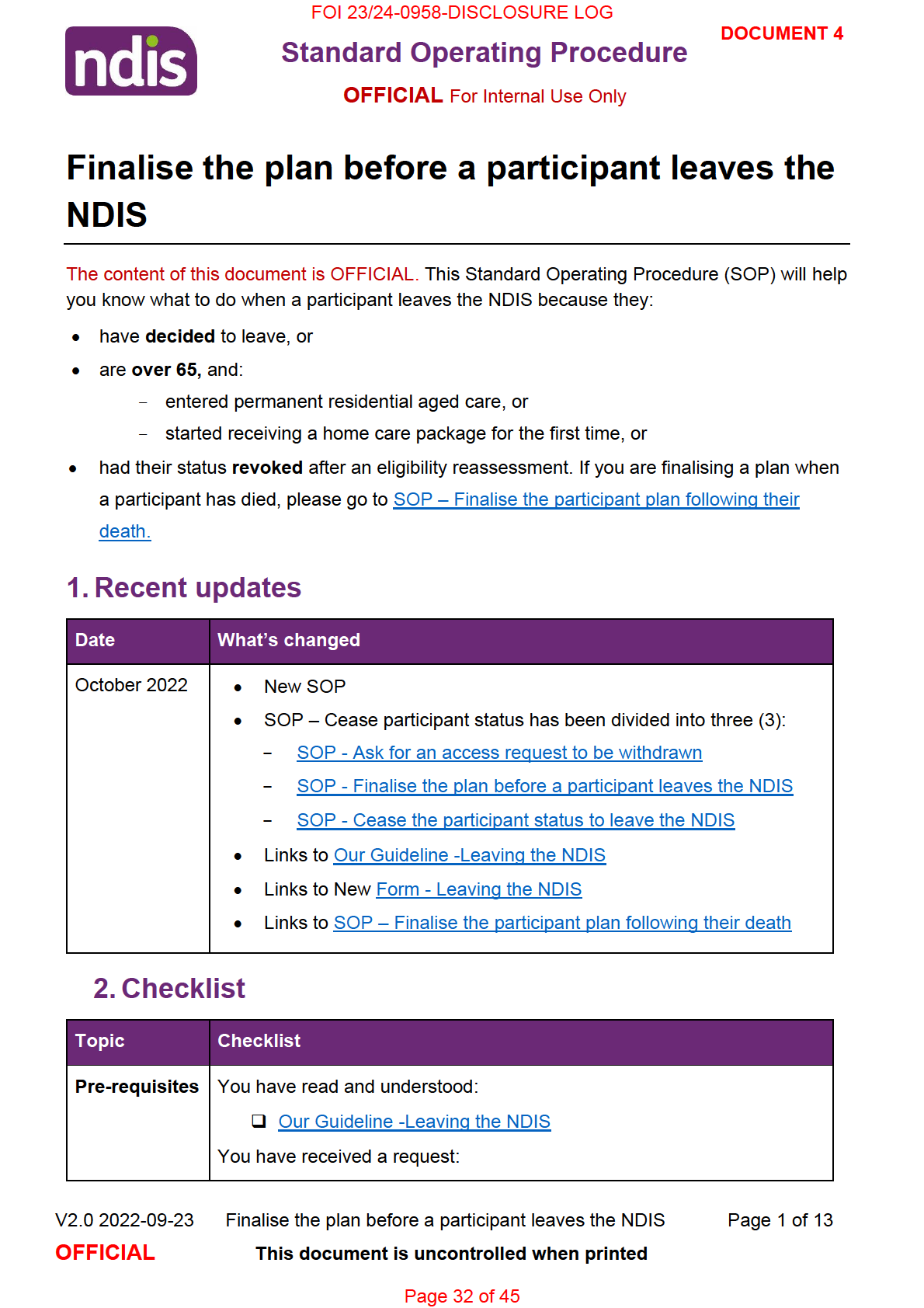

FOI 23/24-0958-DISCLOSURE LOG
Standard Operating Procedure
OFFICIAL For Internal Use Only
s22(1)(a)(ii) - irrelevant material
Participant leaving the NDIS because they:
• <have decided to leave>
• <are over 65 years and
<entered permanent residential aged care / started
receiving a home care package for the first time> on
<enter date from
uploaded evidence>.
• <have had their participant status revoked after an eligibility reassessment>
They are no longer a defined participant. Any future applications should be treated as
new, and evidence of disability must be provided.
V2.0 2022-09-23 Finalise the plan before a participant leaves the NDIS Page 3 of 13
OFFICIAL
This document is uncontrolled when printed
Page 33 of 45

FOI 23/24-0958-DISCLOSURE LOG
Standard Operating Procedure
OFFICIAL For Internal Use Only
s22(1)(a)(ii) - irrelevant material
• For people who decide to leave: explain what happens if you leave the NDIS then
change your mind:
- can reapply if
under 65
- can’t reapply if
over 65 because they don’t meet age requirements anymore
• Explain you have
reviewed the NDIS plan which has (select all that apply):
- <self-managed supports: ask who has been managing these payments>
- <periodic payments>
- <payment requests with negative balances>
- <assistive technology orders not delivered>
- <incomplete home or vehicle modifications>
V2.0 2022-09-23 Finalise the plan before a participant leaves the NDIS Page 6 of 13
OFFICIAL
This document is uncontrolled when printed
Page 34 of 45

FOI 23/24-0958-DISCLOSURE LOG
Standard Operating Procedure
OFFICIAL For Internal Use Only
• Explain
how you can support by:
- finalising the plan before they leave the NDIS
- linking with other supports
• Refer to Our Guideline -Leaving the NDIS to explain the options.
s22(1)(a)(ii) - irrelevant material
V2.0 2022-09-23 Finalise the plan before a participant leaves the NDIS Page 7 of 13
OFFICIAL
This document is uncontrolled when printed
Page 35 of 45

FOI 23/24-0958-DISCLOSURE LOG
Standard Operating Procedure
OFFICIAL For Internal Use Only
s22(1)(a)(ii) - irrelevant material
4. Add an
Interaction using Interaction templates - General - Cease participant status.
Include the following in
Notes field:
• We received evidence on
<DD/MM/YYYY> that the participant is leaving the NDIS
because they:
• <decided to leave>
• <are over 65 years and <entered permanent residential aged care / started receiving a
home care package for the first time> on <enter date from uploaded evidence>.
• <had their participant status revoked after an eligibility reassessment>
• Please cease the participant status in the NDIS business system.
s22(1)(a)(ii) - irrelevant material
3.11 If required, link with other supports
1. Provide linkages/information about supports and services that may be available from the
community and other government services.
2. Consider what relevant supports are available in the person’ area. For example, in:
• all states and territories:
o Other services in your state and territory (external)
• ACT:
o Community Services Directorate (external)
o ACT Community Directory (external)
V2.0 2022-09-23 Finalise the plan before a participant leaves the NDIS Page 10 of 13
OFFICIAL
This document is uncontrolled when printed
Page 36 of 45

FOI 23/24-0958-DISCLOSURE LOG
Standard Operating Procedure
OFFICIAL For Internal Use Only
• NSW:
o Peak bodies (external)
o New South Wales Community Directory (external)
• NT:
o Community support and care (external)
o Northern Territory Community Directory (external)
• QLD:
o Getting support for a health or social issue (external)
o Queensland Community Directory (external)
• SA:
o SA Directory of Community Services (external)
o South Australia Community Directory (external)
• TAS:
o Department of Communities Tasmania (external)
o Tasmania Community Directory (external)
• VIC:
o Services (external)
o Victoria Community Directory (external)
• WA
o Department of Communities Western Australia (external)
o Western Australia Community Directory (external)
s22(1)(a)(ii) - irrelevant material
V2.0 2022-09-23 Finalise the plan before a participant leaves the NDIS Page 11 of 13
OFFICIAL
This document is uncontrolled when printed
Page 37 of 45
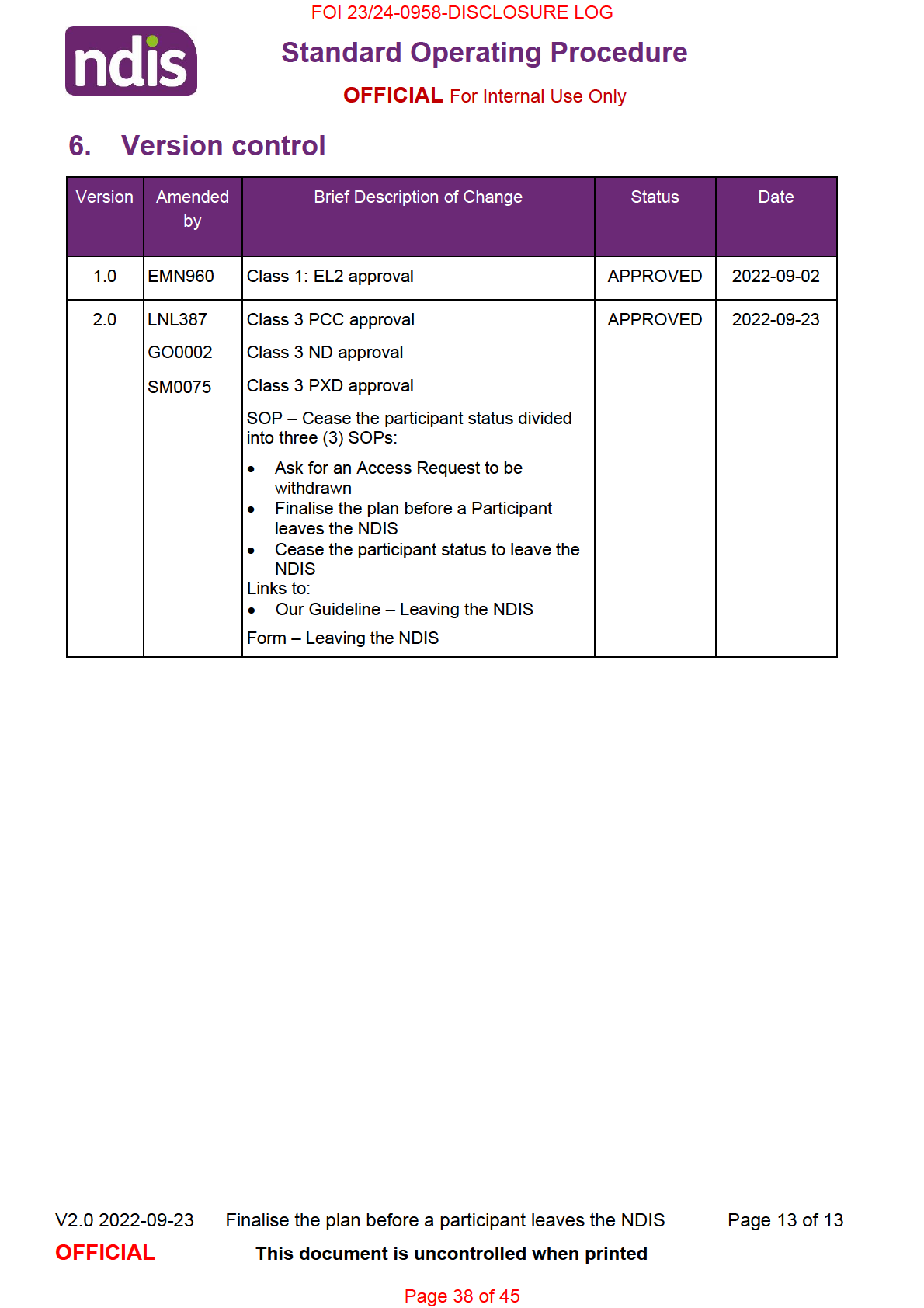

FOI 23/24-0958-DISCLOSURE LOG
OFFICIAL
DOCUMENT 5
Standard Operating Procedure
For Internal Use Only
The contents of this document are OFFICIAL.
Referral Checklist: Eligibility Reassessment or
Access Status Change – Early Intervention
This checklist will help you decide if a participant who joined the NDIS under
early intervention
requirements should be referred for an:
• Eligibility Reassessment (ER); or
• Access status change from early intervention to disability.
A participant must leave the NDIS if they don’t meet the following requirements:
• Residence
• Disability or Early Intervention.
They must also leave the NDIS if they are
over 65 and:
• in permanent
residential aged care for the first time after turning 65, or
• are receiving an
aged care package
This needs to be verified by receiving a copy of the participant’s aged care residential service
agreement to view the date of entry. If you identify a participant over 65, in this situation, you must
help them to leave the NDIS using the SOP – Finalise the plan before a participant leaves the
NDIS.
Don’t complete this checklist.
s22(1)(a)(ii) - irrelevant material
V3.0 2022-07-21
Referral Checklist – ER or Access Status Change – EI
Page 1 of 17
This document is uncontrolled when printed.
OFFICIAL
Page 39 of 45

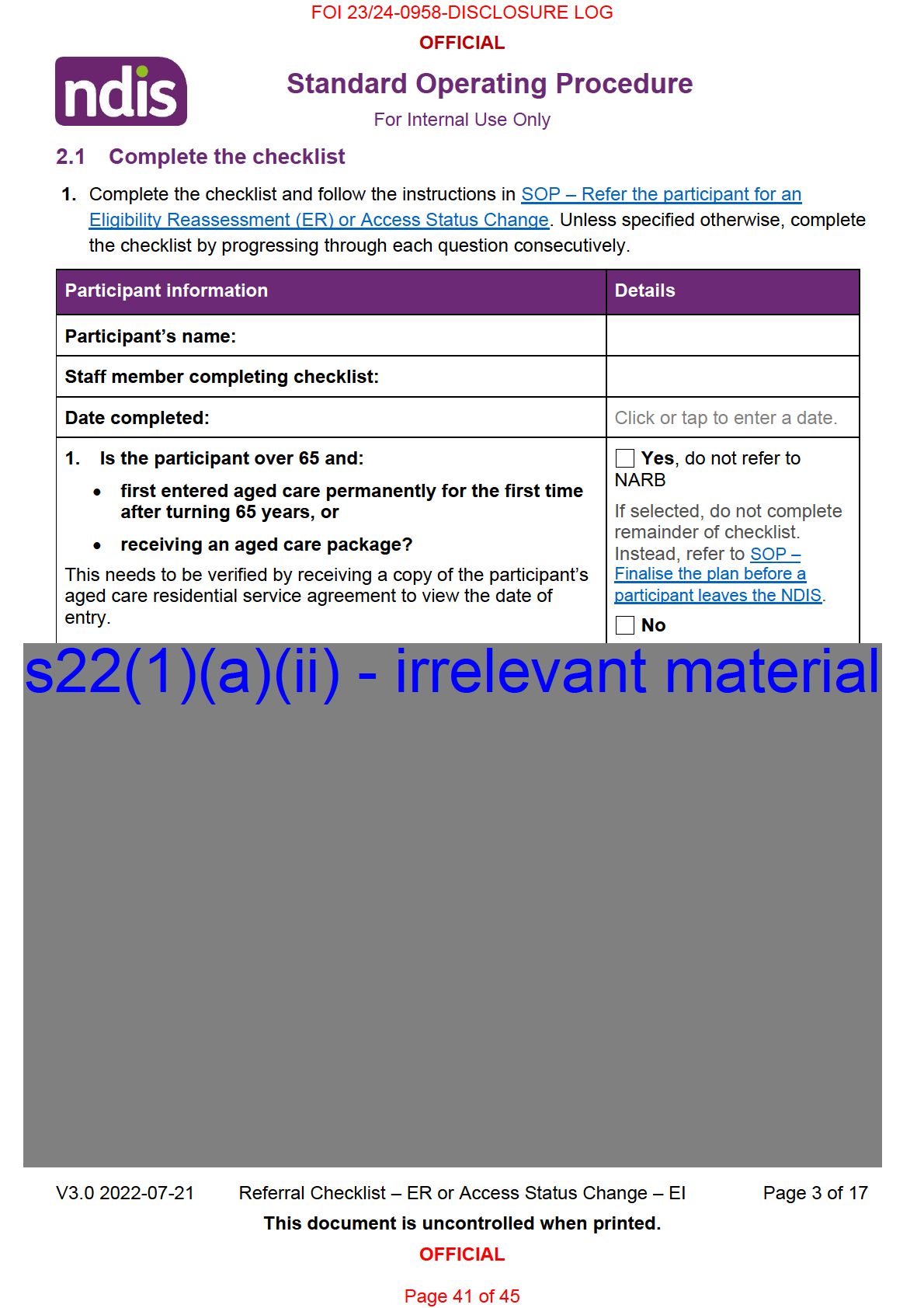
FOI 23/24-0958-DISCLOSURE LOG
OFFICIAL
DOCUMENT 6
The content of this document is OFFICIAL.
Participants with exit reason 'Over 65 and Aged Care' by exit month as at 29 February 2024
1-Jan-22
1-Feb-22
1-Mar-22
1-Apr-22
1-May-22
SDA funding (ever)
0
1
0
0
0
SIL or ILO funding (ever)
0
2
0
0
0
OFFICIAL
Page 42 of 45
FOI 23/24-0958-DISCLOSURE LOG
OFFICIAL
1-Jun-22
1-Jul-22
1-Aug-22
1-Sep-22
1-Oct-22
1-Nov-22
1-Dec-22
1
2
2
2
0
4
0
2
3
2
3
0
6
0
OFFICIAL
Page 43 of 45
FOI 23/24-0958-DISCLOSURE LOG
OFFICIAL
1-Jan-23
1-Feb-23
1-Mar-23
1-Apr-23
1-May-23
1-Jun-23
1-Jul-23
0
4
2
0
2
0
1
0
4
2
0
3
0
1
OFFICIAL
Page 44 of 45
FOI 23/24-0958-DISCLOSURE LOG
OFFICIAL
1-Aug-23
1-Sep-23
1-Oct-23
1-Nov-23
1-Dec-23
1-Jan-24
1-Feb-24
1
2
1
0
1
1
2
2
2
2
1
1
2
3
OFFICIAL
Page 45 of 45




































